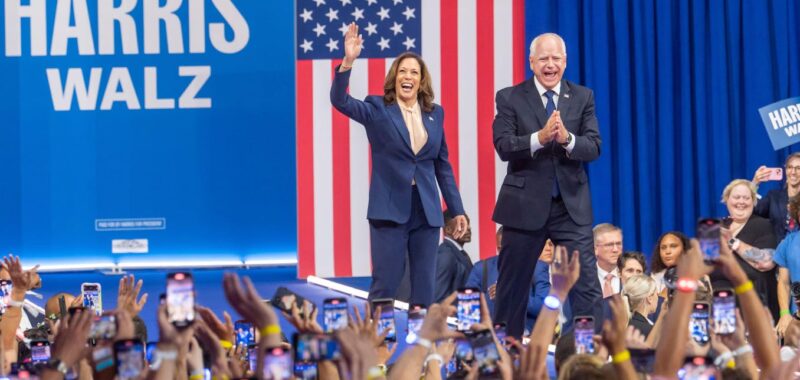Momentum in the 2024 US presidential campaign has fundamentally shifted in recent weeks, and music has played its part in this remarkable transformation. The Harris-Walz campaign is using particular kinds of music to help communicate its optimistic message of hope, inclusion and a brighter future for America.
At The Democratic National Convention (DNC), Kamala Harris stepped onto the podium to deliver her nomination acceptance speech accompanied by her campaign soundtrack, the Beyoncé anthem “Freedom”. Tim Walz walked on stage to the sound of John Mellencamp’s “Small Town” (he grew up in a Nebraska town of 400 people). He walked off to Neil Young’s “Keep on Rockin’ in The Free World”.
In addition to performances from stars like Stevie Wonder, John Legend and Pink, the DNC turned the delegate roll call into a dance party with DJ Cassidy blasting out state-themed songs and rapper Lil Jon singing live at the convention. Normally a rather staid process, this roll-call managed to become one of the most exciting moments of the convention.
For well over two centuries, music has featured in US presidential elections. In 2024, both main parties recognise the positive power of music. While campaign songs and rally playlists encourage a sense of unity, they also send important messages to the wider electorate, reinforcing and differentiating the identity of the party and leader.
This is particularly true in 2024 where campaign songs reflect divergent visions of the country’s future and express competing concepts of freedom, community, patriotism, masculinity, feminism and leadership.
Music and masculinity
Before President Biden ended his re-election bid, music in the 2024 election was most evident in the Republican campaign. Lee Greenwood’s “God Bless the USA” is a centrepiece at all Trump rallies. The song’s patriotic chorus emphasises “being proud to be an American” and finishes with “‘Cause there ain’t no doubt I love this land, God Bless the USA”.
This conservative country song appeals to an idealised version of America’s past, emphasising personal freedom, traditional masculinity, family values and patriotism. Trump rally playlists consist mainly of classic rock anthems from the 1960s, 1970s and 1980s played by white male musicians or all-white male groups.
Hard rock music typically focuses on white heterosexual men and notions of a dominating masculinity. This gendered imagery is reinforced by other frequently played pop songs at Trump rallies including James Brown’s “It’s a Man’s World” and The Village People’s “Macho Man”.
Music in the Trump-Vance campaign emphasises patriotism and a nostalgic return to the conservative Christian values of previous eras. It also privileges white, heterosexual masculinity, reflecting Trump’s self-definition as a so-called “strongman leader”.
Supporters have reinforced this image by writing quasi-religious songs referring to Trump as “the chosen one” with allusions to Jesus. Although this romanticised view of individual leaders as all-powerful male superheroes has been thoroughly debunked, it remains central to Trump’s approach to leadership and governance.
Inclusive leadership
From the outset of her campaign, Harris made Beyoncé’s “Freedom” her official soundtrack and walk-on music. The song – which unites themes of feminism, black womanhood and black identity – featured in Harris’ first campaign ad and a new ad includes a fresh a cappella version.
Beyoncé’s song reinforces the campaign’s emphasis on a more inclusive conception of freedom, and on the value of empowerment and diversity. Highlighting Harris’ identity as a black and south Asian woman, the song speaks to disaffected sections of the US electorate: women, black voters and young people.
In Harris’ playlists black women such as Diana Ross, Aretha Franklin, Chaka Khan, Whitney Houston and Rihanna are prominent. An August rally in Wisconsin played 32 songs, 13 of which were by solo female artists, nine by solo male artists.
Seventeen were by black musicians or all-black groups, 10 by white artists or all-white groups, four by mixed-race artists or groups and one by Latina artist Jennifer Lopez. While pop songs were the most played, this rally also featured funk/soul, R&B and hip-hop – music genres typically associated with black singers and songwriters.
Harris has been endorsed by many artists including Ariana Grande, Carole King, Demi Lovato, Katy Perry and Megan Thee Stallion. British singer Charli XCX announced “Kamala IS brat”, a reference to the title of her latest album that kicks against the gendered expectations placed on women and girls.
By contrast, Trump has repeatedly played songs against artists’ wishes. In August 2024 alone, the former president received “cease and desist” requests from Celine Dion, the family of Isaac Hayes and the Foo Fighters. A Wikipedia page now lists the many singers and bands who have protested against Trump’s use of their music.
Walz has talked about his love of Bruce Springsteen’s songs – music often regarded as that of the working man. At the DNC, he was seen dancing to “Born in the USA”. The Democrats have been keen to highlight Walz’s leadership experience in the military and as state governor, teacher and football coach.
His well-documented commitment to community and support for LGBTQ+ students, however, illustrates a very different conception of masculinity to the strongman image of the Trump campaign. Beginning his DNC speech with an appeal to patriotism, Walz stated: “We’re all here tonight for one beautiful, simple reason: we love this country.”
By reclaiming and re-interpreting ideas often associated with Republican values such as freedom, patriotism, community, masculinity and leadership, the Harris-Walz campaign is projecting a positive, multicultural image that has galvanised the Democratic party and is proving attractive to many voters.
Music is helping the Democrats to redefine their party’s image and identity, and to differentiate their candidate not only from Trump, but also from her previous role as vice president. And it just might help Kamala Harris to become the first woman president of the United States.

Looking for something good? Cut through the noise with a carefully curated selection of the latest releases, live events and exhibitions, straight to your inbox every fortnight, on Fridays. Sign up here.

